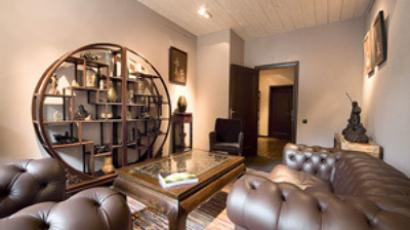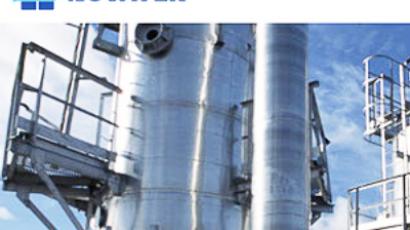IKEA sets itself for the long haul in Russia
Per Kaufmann, the Head of IKEA Russia, spoke with RT about the homeware giants response in Russia to the economic downturn, and its longer term plans for Russia.
RT: How has Ikea been performing so far this year on the Russian market?
PK: "We are a bit surprised because we are doing rather well. We still have a double-digit increase on what we call comparative units – so to say we can really compare. We see in shopping centers that those retailers offering a low price are doing better than those in middle or upscale."
RT: You say "rather well". How does that compare to last year?
PK: "In comparison with last year's sales we are doing a lot more. So we are selling more than 10% more than actually we did last year. But the rate of that increase has gone down. So we see that the crisis is coming, so the increase of our sales in comparison to last year is not as strong at the beginning of the year, in fall, as now.
We would have expected that actually our sales would have been lower because there is so much talk about the crisis. The sales increases in Russia today are the best we have in Europe. So we are actually increasing a lot more than in Western Europe. Eastern Europe is ahead of Western Europe, which shows there is a demand that is still there. It might be a basic demand – that there are as not as many sofas, tables, chairs yet – which means there is a basic demand to fulfill….. Russia is the first concern of increase within the IKEA world…..It's more than 10%, more than a double digit increase."
RT: Are there any areas with notable change?
PK: "Maybe the small articles – what we call satellites or accessories, are increasing a little more than furniture. We try to keep the stock the same but the turn over on the smaller articles is bigger so over time, more of them will be in stock."
RT: How has the company's strategy changed on the Russian market due to the financial crisis?
PK: "Our strategy has not changed yet. We are trying to prepare ourselves for when that will happen. We can say that with the crisis, of course we have the devaluation of the rouble, so we have increased our prices a little bit, but not at all as much as the devaluation in order to keep up. So we are still increasing less than the inflation in Russia, which means that we keep on being competitive.
If you look at when we started in Russia in 2000, since then, we have increased our prices once. Other than that, we have always been decreasing. At the same time, there's been a strong inflation in Russia which means we are more and more competitive and better priced in the eyes of the customer – which can also explain why we are not hit so hard now by the crisis. Or, rather, yet, because it could still come."
RT: How long do you think it will be before the company breaks even in Russia?
PK: "As we are still importing more than we would like to, as we would like to buy more in the Russian market, and we are trying to buy as much as we can, we are even reinforcing that now with the rouble devaluation, but still that hit so us hard that we pushed profitability in front of us. That will push breaking even farther up in time."
RT: How would you rate the investment climate in Russia today?
PK: "Of course, it is harder, because people have less money. But, on the other hand, construction is less expensive, land plots (if you can find them) are cheaper, etc. So it weighs itself out quite a bit. On the other hand, to get rouble financing is not that easy, and if you can get it, it costs quite a bit of money – the interest rates are high. So from that stance, you can say the investment climate is not favorable, if you want to borrow in roubles."
RT: What problems has the company run into?
PK: "We have problems in Samara where we have a shopping center and an IKEA store which we believe are ready but we are not getting the permits. So from that point of view you can say the investment climate has gone down, but I do not believe that this has anything to do with the crisis.
As there is quite a big investment into one of these centers, it is clear that if we are not able to open it up, then the board will ask the question – do we dare to invest in opening new centers? Because if the same thing happens, you are putting in money, but you can't sell. So, of course, that can – will – have an influence on IKEA."
RT: Have you seen any changes in the labor force due to the crisis?
PK: "It's easier to find the kind of people we are looking for today than before. It seems like more competent people are out on the market. So clearly you see a difference there. Also, we see a diminishing turn over in stores, with the tendency that it is more difficult to find another job today. Before it was very easy. Today we are getting to more normal level compared to other countries."
RT: Are there any plans for expansion – both in Russia, and maybe the CIS?
PK: "We are looking to either expand the shopping side at IKEA or to put "big box" retailing – put some on the side. We are looking at quite a number of cities to see if we will buy a site. But we will see what will happen with Samara. That will be sort of decisive about whether we will actually go ahead or not.
We are looking for sites in Ukraine, also Minsk, and Kazakhstan in Almaty. But we have not come so close where we have bought except for Ukraine where we are the owners of one site in Odessa. Now, the economy is such in Ukraine where we have said, we have the site and we have the drawings, so we are working on it, but we are not pushing. Because we are waiting for the economy in the country to show some signs that it will be better in the future.
It seems like economists agree that Russia is in a better position than Ukraine from a macroeconomic point of view. So it's clear that we don't see the same sort of problems in Russia as in Ukraine."














